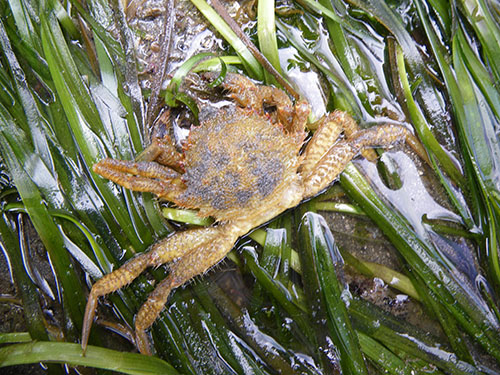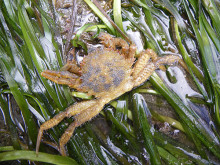Sunday, March 15 1:30 – 3:30 p.m., Odd Fellows Hall
— from Russel Barsh —
 Kwiaht and the Indian Island Marine Health Observatory open the 2015 research and education season at Indian Island with a fourth annual Tides of March educational event for Orcas families and children at Odd Fellows Hall overlooking Indian Island, from 1:30 pm to 3:30 pm on Sunday afternoon March 15. Admission is free.
Kwiaht and the Indian Island Marine Health Observatory open the 2015 research and education season at Indian Island with a fourth annual Tides of March educational event for Orcas families and children at Odd Fellows Hall overlooking Indian Island, from 1:30 pm to 3:30 pm on Sunday afternoon March 15. Admission is free.
This year’s Tides event features a special musical performance by Orcas Island Elementary School Fifth Graders, inspired by storm water issues and mentored by Sharon Abreu and Michael Hurwicz. It is part of an experimental project combining science with performing arts involving Kwiaht ecologist Russel Barsh, supported by the Orcas Island Community Foundation
“What a treat it has been working with this enthusiastic, creative, bright class and their wonderful teacher Nancy Knapp,” says Sharon Abreu. “They give us hope for the future.
There will also be a slideshow summarizing current research on pollution sources and rain garden design in East Sound, briefings by volunteers on the 2015 research and educational program at Indian Island, and tips for getting involved. Meet the two young illustrators of Betty Jean Rodenberger’s poetry book, The Oystercatcher Family of Indian Island, and enjoy a sideboard of sweet and savory baked treats!
Environmental chemistry is a new focus of Kwiaht’s work at Indian Island and in the schools. Find out what radishes and onions have to do with copper pollution, and why Orcas students will be collecting bees and pollen this spring. Kwiaht recently purchased a biochemistry micro-lab for Orcas Middle School that will be available one day per week for student projects. Studies planned for this year include neonicotinoid pesticides, algal toxins, surfactants used in automotive products, and endocrine disrupting compounds in local salmon.
“Although we have seen some recent reduction of pesticide levels in Eastsound clams,” Barsh explains, “we need to take a more systematic approach to identifying toxic threats and addressing them through consumer choice, and building more, better designed and maintained rain gardens along streets and parking areas.”
Climate change is also a growing concern of Kwiaht’s Indian Island monitoring program. “Globally, 2014 was the warmest year in more than a century,” says Barsh, noting that in the Pacific Northwest, sea temperatures rose more than air temperatures.
“This year is shaping up to be unusually warm as well.” Warming may have been a factor in the conspicuous death of hundreds of Ochre Stars around Indian Island last summer, Barsh says. Hundreds of juvenile sea stars have replaced the lost ones, he says, but it remains to be seen how well they survive the heat of another summer. “At least two diseases are affecting Salish Sea stars, Orchitophrya and SWS, and both of them are facilitated by warmer waters.”
**If you are reading theOrcasonian for free, thank your fellow islanders. If you would like to support theOrcasonian CLICK HERE to set your modestly-priced, voluntary subscription. Otherwise, no worries; we’re happy to share with you.**








